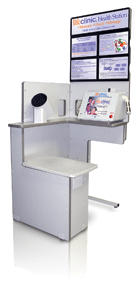


Archive
Advertisers Index
Products & Services
Job Opportunities
Media Kit - PDF
HTAA Sign-up!
Online Classifieds
Receive extra copies!
Driver HEALTH
800-878-0311 x2111
Features
Cover Story
An exclusive interview with John Kelly, M.D.Healthy Trucking
Can addiction be good?Jay Noller
Jay Noller has a NEED for SPEEDKarla Horack
For better, or for worseJoseph Yao, M.D.
Heel painMarie Rodriguez
Meditation basics
Highway Angels
Minstar Transport driver aids accident victim
Nate Browne
Taking responsibility
Industry News
It's news to me!
Departments
Publisher's Desk
Health, Wellness and Safety Pavilion debuts at GATS
Murphy's World
Stand-up routine for cops falls flat
Say What?
Can you maintain a healthy lifestyle on the road?
Fun & Games
From the warped mind of Steven Wright
John Kelly, M.D.
Chairman of the HTAA Health and Medical Advisory Board Dr. John T. Kelly received his M.D. from Harvard Medical School and his Ph.D. from Harvard University. He is currently Chief Medical Officer of Lifeclinic International and serves as the Head of the Healthy Trucking Association of America Medical Advisory Board.
Dr. John T. Kelly received his M.D. from Harvard Medical School and his Ph.D. from Harvard University. He is currently Chief Medical Officer of Lifeclinic International and serves as the Head of the Healthy Trucking Association of America Medical Advisory Board.
Dr. Kelly previously served as Chief Health and Medical Officer of Union Pacific Railroad, one of America’s leading transportation companies. He has also served as Senior Vice President of Scientific and Regulatory Affairs of Pharmaceutical Research and Manufacturers of America, President of the clinical information management organization of Aetna, Inc., Director of the Office of Quality and Utilization Management of the American Medical Association and a practicing emergency physician.
Driver HEALTH recently talked with Dr. Kelly about his work and his recommendations to improve driver health and wellness:
How did you become interested in health improvement and preventive services?
I have treated many drivers in the emergency room. Many of their illnesses – heart attacks, cancer, diabetes, and pneumonia – could have been prevented by stopping smoking, controlling high blood pressure, managing weight or receiving flu shots.
I have managed health improvement programs for thousands of drivers. The programs have helped them stop smoking, control their blood pressure, manage their weight and improve their health.
Are the programs effective?
Many companies have established effective health improvement programs. These include health education, risk assessments, preventive screenings, stopping smoking, healthy eating, increased physical activity and improved mental health.
Drivers who participate in company health and wellness programs often improve awareness of their health risks, develop effective plans to reduce their health risks and improve their health and wellness.
How can drivers learn about health improvement programs?
Driver HEALTH magazine describes many examples of drivers who have successfully used health improvement programs to improve their health and wellness.
Drivers can also learn about health improvement programs from their company, co-workers, friends and family.
Are preventive services effective?
There are many effective preventive services that identify health risks and prevent illness. Recommended services include blood pressure screening, cancer screening, diabetes screening, cholesterol screening and vaccinations against flu and pneumonia.
How can drivers learn about available preventive services?
Drivers should learn which preventive services are recommended for them. The Centers for Disease Control and Prevention (CDC) Web site (cdc.gov) is an excellent source of information about preventive services. The site discusses prevention of heart disease, cancer, diabetes and many other illnesses. It also provides practical information on staying healthy.
Another excellent source of information is the U.S. Preventive Services Task Force (USPSTF) Web site (ahrq.gov/clinic/uspstfix.htm).
USPSTF is an independent panel of experts who make recommendations for clinical preventive services to prevent illnesses such as heart disease, cancer and diabetes.
How can drivers prevent high blood pressure?
Drivers can prevent high blood pressure by adopting a healthy lifestyle, which includes:
• Maintaining a healthy weight
• Being physically active
• Following an eating plan that emphasizes fruits, vegetables and low-fat dairy foods
• Choosing foods with less salt and sodium
• Quitting smoking
• Drinking alcoholic beverages in moderation
If lifestyle changes alone are not effective in controlling high blood pressure, it may be necessary to take blood pressure medications.
What are the benefits of controlling high blood pressure?
Once high blood pressure is under control, heart attacks are reduced by 21 percent, strokes by 37 percent and all deaths from cardiovascular disease by 25 percent.
What is another example of a preventive service?
The health benefits of quitting smoking are well known. Although quitting smoking is difficult, many drivers have successfully done so. The following steps have helped many drivers to quit smoking:
• Get support
• Learn new skills and behaviors
• Get medication and use it correctly
• Be prepared for relapse
Where can drivers receive preventive services?
Preventive services are often available at company work sites or company-sponsored events. They are also available at pharmacies, medical clinics and physician offices.
Why don’t drivers receive recommended preventive services?
Although most drivers understand the benefits of preventive services, many do not receive them because of inconvenience, cost or other priorities.
Among drivers with high blood pressure, approximately one in five do not know that they have it. Among drivers taking medicines for high blood pressure, approximately one in three don’t have their blood pressure under control.
What are obstacles to healthy living?
Understanding the obstacles to healthy living, such as a lack of motivation, inadequate time and insufficient resources, then developing effective strategies to overcome these obstacles, is a critical step on the road to health.
Experts encourage drivers to:
• Consider why healthy living is important to your family, friends and co-workers
• Consider why your employer supports it
• Consider how you can better use your time to support it
• Consider what resources are available for you to support it
© Copyright,
Ramp Media Group, 2010